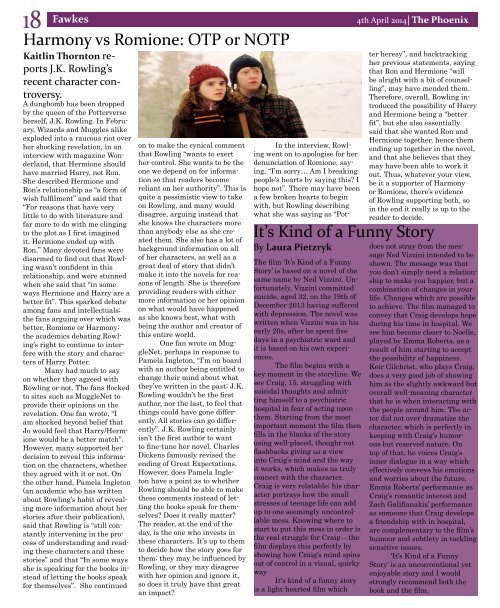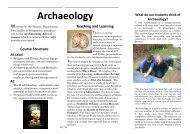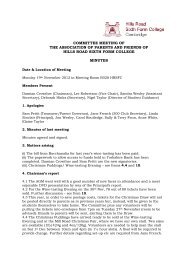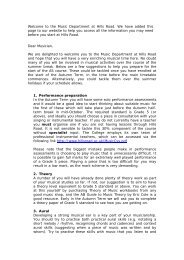The Phoenix - Hills Road Sixth Form College
The Phoenix - Hills Road Sixth Form College
The Phoenix - Hills Road Sixth Form College
Create successful ePaper yourself
Turn your PDF publications into a flip-book with our unique Google optimized e-Paper software.
18Fawkes 4th April 2014| <strong>The</strong> <strong>Phoenix</strong>Harmony vs Romione: OTP or NOTPKaitlin Thornton reportsJ.K. Rowling’srecent character controversy.A dungbomb has been droppedby the queen of the Potterverseherself, J.K. Rowling. In February,Wizards and Muggles alikeexploded into a raucous riot overher shocking revelation, in aninterview with magazine Wonderland,that Hermione shouldhave married Harry, not Ron.She described Hermione andRon’s relationship as “a form ofwish fulfilment” and said that“For reasons that have verylittle to do with literature andfar more to do with me clingingto the plot as I first imaginedit, Hermione ended up withRon.” Many devoted fans weredisarmed to find out that Rowlingwasn’t confident in thisrelationship, and were stunnedwhen she said that “in someways Hermione and Harry are abetter fit”. This sparked debateamong fans and intellectuals;the fans arguing over which wasbetter, Romione or Harmony;the academics debating Rowling’sright to continue to interferewith the story and charactersof Harry Potter.Many had much to sayon whether they agreed withRowling or not. <strong>The</strong> fans flockedto sites such as MuggleNet toprovide their opinions on therevelation. One fan wrote, “Iam shocked beyond belief thatJo would feel that Harry/Hermionewould be a better match”.However, many supported herdecision to reveal this informationon the characters, whetherthey agreed with it or not. Onthe other hand, Pamela Ingleton(an academic who has writtenabout Rowling’s habit of revealingmore information about herstories after their publication),said that Rowling is “still constantlyintervening in the processof understanding and readingthese characters and thesestories” and that “In some waysshe is speaking for the books insteadof letting the books speakfor themselves”. She continuedon to make the cynical commentthat Rowling “wants to exerther control. She wants to be theone we depend on for informationso that readers becomereliant on her authority”. This isquite a pessimistic view to takeon Rowling, and many woulddisagree, arguing instead thatshe knows the characters morethan anybody else as she createdthem. She also has a lot ofbackground information on allof her characters, as well as agreat deal of story that didn’tmake it into the novels for reasonsof length. She is thereforeproviding readers with eithermore information or her opinionon what would have happenedas she knows best, what withbeing the author and creator ofthis entire world.One fan wrote on MuggleNet,perhaps in response toPamela Ingleton, “I’m on boardwith an author being entitled tochange their mind about whatthey’ve written in the past; J.K.Rowling wouldn’t be the firstauthor, nor the last, to feel thatthings could have gone differently.All stories can go differently”.J.K. Rowling certainlyisn’t the first author to wantto fine-tune her novel. CharlesDickens famously revised theending of Great Expectations.However, does Pamela Ingletonhave a point as to whetherRowling should be able to makethese comments instead of lettingthe books speak for themselves?Does it really matter?<strong>The</strong> reader, at the end of theday, is the one who invests inthese characters. It’s up to themto decide how the story goes forthem; they may be influenced byRowling, or they may disagreewith her opinion and ignore it,so does it truly have that greatan impact?It’s Kind of a Funny StoryBy Laura Pietzryk<strong>The</strong> film ‘It’s Kind of a FunnyStory’ is based on a novel of thesame name by Ned Vizzini. Unfortunately,Vizzini committedsuicide, aged 32, on the 19th ofDecember 2013 having sufferedwith depression. <strong>The</strong> novel waswritten when Vizzini was in hisearly 20s, after he spent fivedays in a psychiatric ward andit is based on his own experiences.<strong>The</strong> film begins with akey moment in the storyline. Wesee Craig, 15, struggling withsuicidal thoughts and admittinghimself to a psychiatrichospital in fear of acting uponthem. Starting from the mostimportant moment the film thenfills in the blanks of the storyusing well-placed, thought-outflashbacks giving us a viewinto Craig’s mind and the wayit works, which makes us trulyconnect with the character.Craig is very relatable; his characterportrays how the smallstresses of teenage life can addup to one seemingly uncontrollablemess. Knowing where tostart to put this mess in order isthe real struggle for Craig – thefilm displays this perfectly byshowing how Craig’s mind spinsout of control in a visual, quirkywayIt's kind of a funny storyis a light-hearted film whichIn the interview, Rowlingwent on to apologise for herdenunciation of Romione, saying,“I’m sorry… Am I breakingpeople’s hearts by saying this? Ihope not”. <strong>The</strong>re may have beena few broken hearts to beginwith, but Rowling describingwhat she was saying as “Potterheresy”, and backtrackingher previous statements, sayingthat Ron and Hermione “willbe alright with a bit of counselling”,may have mended them.<strong>The</strong>refore, overall, Rowling introducedthe possibility of Harryand Hermione being a “betterfit”, but she also essentiallysaid that she wanted Ron andHermione together, hence themending up together in the novel,and that she believes that theymay have been able to work itout. Thus, whatever your view,be it a supporter of Harmonyor Romione, there’s evidenceof Rowling supporting both, soin the end it really is up to thereader to decide.does not stray from the messageNed Vizzini intended to beshown. <strong>The</strong> message was thatyou don’t simply need a relationshipto make you happier, but acombination of changes in yourlife. Changes which are possibleto achieve. <strong>The</strong> film managed toconvey that Craig develops hopeduring his time in hospital. Wesee him become closer to Noelle,played by Emma Roberts, as aresult of him starting to acceptthe possibility of happiness.Keir Gilchrist, who plays Craig,does a very good job of showinghim as the slightly awkward butoverall well-meaning characterthat he is when interacting withthe people around him. <strong>The</strong> actordid not over-dramatize thecharacter, which is perfectly inkeeping with Craig’s humorousbut reserved nature. Ontop of that, he voices Craig’sinner dialogue in a way whicheffectively conveys his emotionsand worries about the future.Emma Roberts’ performance asCraig’s romantic interest andZach Galifianakis’ performanceas someone that Craig developsa friendship with in hospital,are complementary to the film’shumour and subtlety in tacklingsensitive issues.‘It’s Kind of a FunnyStory’ is an unconventional yetenjoyable story and I wouldstrongly recommend both thebook and the film.<strong>The</strong> <strong>Phoenix</strong> |4th April 2014This is no time for a cunning plan Mr GoveBeth Cadwalladr looksinto Michael Gove’scriticism of Blackadder.Melchett: Field Marshal Haighas formulated a brilliant newtactical plan to ensure final victoryin the field.Blackadder: Ah. Would this brilliantplan involve us climbingout of our trenches and walkingvery slowly towards the enemy?Captain Darling: How could youpossibly know that, Blackadder?It's classified information!Blackadder: It's the same planthat we used last time. And theseventeen times before that.This quote is fairly typicalof the attitude of Blackadder,in the historical sitcom‘Blackadder Goes Forth’, towardsthe generals who led theBritish army in the First WorldWar. <strong>The</strong> actual Commander inChief, Douglas Haig, and thefictional General Melchett aredepicted as incompetent and uncaring,happy to sacrifice countlesssoldiers in order to ‘movehis drinks cabinet six inchescloser to Berlin’. <strong>The</strong> show bothdrew from and contributed tothe general perception that thearmy in the war consisted of‘lions led by donkeys’, and itis this ‘prevailing myth’ whichEducation Secretary MichaelGove wanted to challenge in hiseditorial for the Daily Mail.Gove claimed that theFirst World War was a ‘justwar’, and that to claim otherwiseis ‘belittling true Britishheroes’. He denounced not onlyBlackadder, but also ‘Left-wingacademics’ who ‘denigrate patriotism’,and Oh! What a LovelyWar, a play which was recentlystaged at <strong>Hills</strong> <strong>Road</strong>. Nevermind that Alan Clark, whose1961 book <strong>The</strong> Donkeys is oneof the most scathing historicalcriticisms of the British leadership,was a ConservativeMP. Never mind that the finalepisode of Blackadder is widelyregarded as a poignant masterpiece,praised by critics andveterans alike as it cuts throughthe comedic idiosyncrasies toreveal something rather morevulnerable and moving thanGove's casual dismissal wouldhave you believe. But MichaelGove has declared it 'belittling',so clearly it must be.<strong>The</strong> Blackadder criticismhas been the focus of attentionboth from those who agree andthose who disagree with Gove.But there is a far more importantquestion behind the attention-grabbingheadlines. 100years on from the outset of theFirst World War, how should wecommemorate and remember it?Were the deaths of hundreds ofthousands of soldiers in northernFrance or Turkey justifiedas a reaction to an 'aggressivelyexpansionist' Germany, as Govewould have us believe? Werethey an unforgivable crime committedby arrogant generals,who didn't care about the livesof the ordinary soldiers and refusedto change tack even whenthe outcomes were disastrous?Or is there a far more nuancedpicture, one of leaders who wereflawed human beings who mademistakes and sometimes failedto learn from them, of brandnew styles of warfare that neitherside knew how to fight successfully,of different criteria bywhich you can measure success?Ultimately, whether thesoldiers and civilians who werelost died in vain or not, they diddie. So we have an obligation toremember them solemnly, withdignity and respect, and notturn this tragic period of worldhistory into petty political pointscoringor jingoistic flag-waving.At the going down of the sun,and in the morning,We will remember them.PeroxideReviewed by EleanorHarrisonNina Nesbitt has come along way in the last few years:from first being discovered byfellow singer-songwriter EdSheeran up until the releaseof her debut album Peroxide,released on 17th February. Hercareer kicked off when she appearedin Ed Sheeran’s video for‘Drunk’ and then supported bothhim and Disclosure on tour.Since then the half Swedish,half Scottish singer recordeda number of EPs before gainingmore mainstream attentionwhen her cover of FleetwoodMac’s ‘Don’t Stop’ featured in aJohn Lewis advert in September2013. Over this time shehas built a huge fan-base (the“Nesbians”) as well as gaining alot of experience performing liveand she has been a big hit at anumber of festivals.Her music has beendescribed as a much neededbreath of fresh air for the currentpop music scene (partlybecause she manages to keepall her clothes on in her musicvideos with no twerking insight) but her tracks also covera fairly wide spectrum of musicalstyles. ‘<strong>The</strong> Outcome’ hasmore of a rock feel while ’18 candles’is reminiscent of KT Tunstall’searlier sound. Along withthese the album is packed withcatchy tunes, clever hooks andbouncy melodies but also moremelodic and emotional pieces aswell. Her song with Kodaline,“Hold On” is a different soundFawkes19again with a simple piano accompaniment.<strong>The</strong> last song onthe album ‘<strong>The</strong> Hardest Part’is perhaps the song that showsoff her talent best with all theadded extras stripped away togive a serving of poignant vocalsand understated, delicate acoustics.After listening to the albumas a whole for the first time, thistrack leaves you wanting more.It is not just her soundwhich is more sophisticatedthan many people would expect.She is a real DIY artistwho has had to put in the workto get to the top and, while shehas learned a lot since she firstpicked up a guitar aged 15, hervoice is still very much one ofa normal teenager. She tacklestopics that many people our agecan relate to but in a more matureway than other artists whoattempt to do the same thing.Her first charting single ‘StayOut’ comments on the oftenmeaningless trends we feel theneed to conform to in an attemptto fit in, while her lead single ofthe album ‘Selfies’ says a littlemockingly, “I’ll post it up inblack and white, with a depressingquote on my life” referringto how people will take picturesof themselves looking happy orshowing them enjoying their lifeto help get over things hurtingthem. While both these songsare incredibly catchy they showa subtle wit that is often lackingin the current chart hits.‘Peroxide’ is a mixed bagand it has been met with bothcritical and encouraging reviews.<strong>The</strong>re are many songswhich do show off her talentbut others feel a bit too safe andforgettable or sugary enoughto rot your teeth. She has beencriticised for trying to be toomuch like country singer TaylorSwift, or just producing tracksthat will get sales rather thanmaking a musical statement.However, from what I have seen,a majority of the tracks are solidand have been put together withconviction. Nina Nesbitt may bethe new marmite but it is safe tosay she has a promising futureahead of her that doesn’t needbleaching to make it brighter.
















